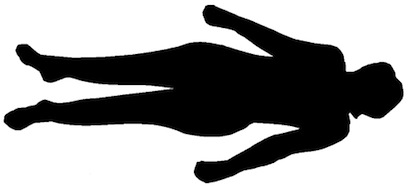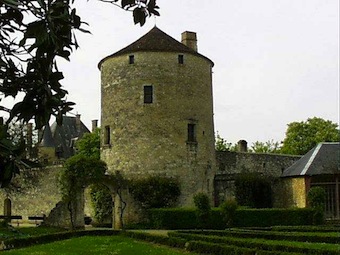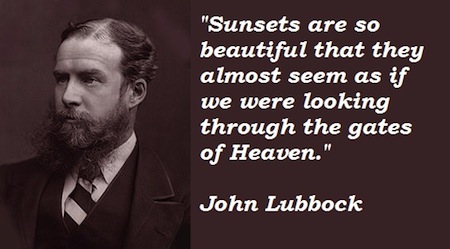LETTERS FROM THE GLOBAL PROVINCE
Rest and Repose, Global Province Letter, 26 June 2013
Rest is not idleness, and to lie sometimes on the grass under trees on a summer's day, listening to the murmur of the water, or watching the clouds float across the sky, is by no means a waste of time. —John Lubbock, First Baron Avebury, 1834-1913
Summer Solstice. Summer is upon us, but we hardly notice, for we all have inherited the disease that most engulfs modern man, relentless activity, a to and fro where we rush about only to land in the same place we started, mixed with a cellphone and digital obsession that chains us to a very small place on this earth and locks out the many universes that populate the cosmos.
But the summer solstice has just slipped by, begging us to take a vacation from our frenetics and replenish the self. Yet in a summer place, say Nantucket, one bumps into urbanites of such velocity that it is hard to believe that modern man knows how to slow down any longer. The humorous little car stickers “Twenty is plenty in Sconset,” once available in the quieter village seven miles across the island from Nantucket town, seem as dated now as the naughty ditties that used to decorate the walls of summer cottages.
 Shavasana or Savasana. It is within the context of this 24/7 subservience to the commands of our digital virtual world, of vacations that are not vacations, that the blossoming practice of yoga takes on full meaning. The practice of yoga, according to one trade publication, has shot up 30% or so since 2008, with women (80%) and the young (60%) making up the bulk of its audience. Perhaps 8% of Americans now participate in yoga, to a greater or lesser degree. While these numbers are not overwhelming, they do suggest that a very significant fraction of our countrymen now understand that the exercise of repose is more important to their health and happiness than the exercise of competition. Yoga, we think, will have turned a corner when our growing senior population takes its benefits to heart and realize that it has something to do with their sense of well-being in their second childhood (old age).
Shavasana or Savasana. It is within the context of this 24/7 subservience to the commands of our digital virtual world, of vacations that are not vacations, that the blossoming practice of yoga takes on full meaning. The practice of yoga, according to one trade publication, has shot up 30% or so since 2008, with women (80%) and the young (60%) making up the bulk of its audience. Perhaps 8% of Americans now participate in yoga, to a greater or lesser degree. While these numbers are not overwhelming, they do suggest that a very significant fraction of our countrymen now understand that the exercise of repose is more important to their health and happiness than the exercise of competition. Yoga, we think, will have turned a corner when our growing senior population takes its benefits to heart and realize that it has something to do with their sense of well-being in their second childhood (old age).
We ourselves think of savasana as the culmination of yoga, that point at which motion ceases and one is reaching for absolute stillness. Wikipedia is quite elegant about this part of the practice:
Shavasana is perhaps the most important part of yoga practice. Lying on the back, the arms and legs are spread at about 45 degrees, the eyes are closed and the breath deep, using deerkha (long) pranayama. The whole body is relaxed onto the floor with an awareness of the chest and abdomen rising and falling with each breath. All parts of the body are scanned for muscular tension of any kind, which is consciously released as it is found, optionally with a small repetitive movement of the area. All control of the breath, the mind, and the body is then released for the duration of the asana, typically 20–30 minutes although often less in Western yoga classes.
We like to think of yoga and the meditative arts as ways to achieve counter-rhythm, to consciously shift the gears of mind and body such that they simply move at a different pace than things outside the self.
 Montaigne’s Solitarium. But if we are to have successful restorative vacations, we must do more than makeover our minds and bodies, however we do that. The world is so intrusive, even for Buddhist monks amidst their temples across Asia, that one must carve out a place that affords special contentment. Steve King of Today in Literature tells us how Michel de Montaigne accomplished just this in Montaigne’s Solitarium:
Montaigne’s Solitarium. But if we are to have successful restorative vacations, we must do more than makeover our minds and bodies, however we do that. The world is so intrusive, even for Buddhist monks amidst their temples across Asia, that one must carve out a place that affords special contentment. Steve King of Today in Literature tells us how Michel de Montaigne accomplished just this in Montaigne’s Solitarium:
Montaigne came from a patrician Bordeaux family, one which obligated him to many political responsibilities, but in his late thirties he retreated to the tower rooms of the family estate to write the first two books of his Essays. When these were published in 1580 -- a third volume was published in 1588 -- they introduced a new literary genre to European letters.
Montaigne's tower retreat or "solitarium" has evolved into something of an icon for bibliophiles, and is today a popular museum for the literary traveler. On the first floor Montaigne had a chapel; on the second floor he had his bedroom (though he had others, and five daughters); on the top floor, a round room "of sixteen paces in diameter," amply-windowed and 1000-volumed, was his library. Here he would read write and dictate, carving into the roof-beams forty-eight quotations from what he had written. The dedicatory carving, taking its special place above the fireplace, might cause a sigh in all book lovers:
In the year of Christ 1571, at the age of thirty-eight, on the last day of February, anniversary of his birth, Michel de Montaigne, long weary of the servitude of the court and of public enjoyments, while still entire, retired to the bosom of the learned Virgins [Muses], where in calm and freedom from all cares he will spend what little remains of his life now more than half run out. If the fates permit, he will complete this abode, this sweet ancestral retreat, and he has consecrated it to his freedom, tranquility, and leisure.
Montaigne wrote on a wide range of topics -- education, cannibals, drunkenness, war-horses, repentance, thumbs -- and in a highly readable, thoroughly skeptical way. The roof-beam carvings convey his general frame of mind:“The plague of man is the opinion of knowledge.
I establish nothing. I do not understand. I halt. I examine.
Breath fills a goatskin as opinion fills an hollow head.
Not more this than that -- why this and not that?
Have you seen a man that believes himself wise? Hope that he is a fool.
Man, a vase of clay.
I am Human, let nothing human be foreign to me.
What inanity is everything!"Late in life, Montaigne was obliged to return to political life as mayor of Bordeaux, performing his duties with efficiency and indifference. In "On Controlling One's Will," one of the last essays in his final collection, he proudly agrees with his detractors: "They also say that my term of office passed without leaving any trace or mark. That is good!" He goes on to recommend such detachment to all:
“He who does not gape after the favor of Princes, as after a thing he cannot do without, is not greatly piqued by the coolness of their reception and countenance, nor by the inconstancy of their affections. He who does not brood over his children or his honors with slavish fondness, will manage to live comfortably after he has lost them.”
 John Lubbock, First Baron Avebury. John Lubbock, whose love for a rest on a grassy knoll we cite above, was an extraordinarily busy, prolific, talented man. He was a banker, politician, scientist, polymath, and more. From him we learn that nature may better electrify the soul than Montaigne’s monastic hideout. Indeed, he calls on us to use our solitude well, to make it a venue for happiness, not a torturous cell, urging us to lie back on the grass and to listen to the murmur of water. As he says, “The whole value of solitude depends upon oneself; it may be a sanctuary or a prison, a haven of repose or a place of punishment, a heaven or a hell, as we ourselves make it.”
John Lubbock, First Baron Avebury. John Lubbock, whose love for a rest on a grassy knoll we cite above, was an extraordinarily busy, prolific, talented man. He was a banker, politician, scientist, polymath, and more. From him we learn that nature may better electrify the soul than Montaigne’s monastic hideout. Indeed, he calls on us to use our solitude well, to make it a venue for happiness, not a torturous cell, urging us to lie back on the grass and to listen to the murmur of water. As he says, “The whole value of solitude depends upon oneself; it may be a sanctuary or a prison, a haven of repose or a place of punishment, a heaven or a hell, as we ourselves make it.”
If Lubbock be our model, the task, for those of us who would have a good vacation or be creatively prolific, is to achieve a state of repose somewhat at odds with the society we inhabit and to get out on a hillside where there are only clouds overhead.
P.S. In “The Post-Consumptive Society,” we suggested that many are trying to get over the addictions of a mass consumption civilization in order to lead a more measured life. Of course, as we say here, the problem is to replace consumption with something more fulfilling.
P.P.S. The Greeks supplied us with all sorts of philosophical tangents, often to deal with the emerging stresses of their world. The Epicureans thought we might surround ourselves with gardens and beauty to shut out the horrors of a tumultuous world. The Stoics told us to make a garden of the mind, such that one’s ruminations took one in to the clouds in order to banish earthly fulminations. We claim that one needs both—a mind at peace but a real garden to inhabit. One must take care of the self but also nurture one’s surroundings.
Home - About This Site - Contact Us
Copyright 2013 GlobalProvince.com